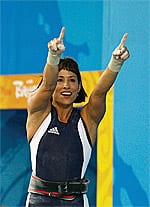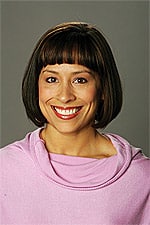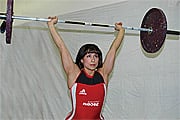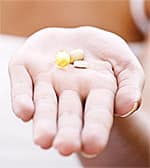Life Extension Magazine®
How many women in the world can lift 238 pounds in weight over their heads and hold it there for a couple of seconds? Not many. But viewers who tuned in to the 2008 summer Olympics and watched the women’s weightlifting events marveled at those who can, including 33-year-old Melanie Roach, a former gymnast who holds the number one spot on the US women’s Olympic weightlifting team. Roach burst onto the competitive weightlifting scene virtually from nowhere. Her rapid rise from obscurity and her many accomplishments in world-class competition are even more remarkable in the context of her personal life. She is the mother of three small children under age seven—including five-year-old Drew, who is autistic. Her husband, Dan, is a busy fourth-term incumbent legislator in the Washington state House of Representatives. She is also a businesswoman and a Sunday school teacher, and not surprisingly, she doesn’t get much sleep.
At 5’1” and a trim 117 pounds, Roach is a petite powerhouse who shatters the stereotypical image of a weightlifter. True, there are women in the sport who are large, even obese, but Roach insists that the sport itself doesn’t turn you into a gigantic hulk. “The sport makes you fit if you do it right. Strength doesn’t always equate with size—there are a lot of women out there who are very strong, you just don’t know that from looking at them,” she says. As with any athletic endeavor, Roach says the keys to success in weightlifting are proper nutrition, a regular fitness program, good coaching, and a program of nutritional supplements that includes vitamins, amino acids, and products such as D-ribose that support cellular energy production. In fact, Roach credits her D-ribose supplementation in particular with providing her the energy she needs to be competitive in weightlifting, while dealing with the stress and hectic schedule of running a business and handling family responsibilities. She says it also helped her to recover quickly and completely from devastating injuries that could have ruined her weightlifting career. A Promising StartThat career and the road to Beijing started for Roach in 1994 when she was in college. After injuring herself out of competitive gymnastics and into a coaching role, she met a gymnastics judge who invited her to try weightlifting. Roach discovered she had a natural talent for the clean and jerk lift and fell in love with the sport, calling it “love at first lift.” Fate had placed a nationally known weightlifting coach, John Thrush, practically in her backyard, and she began training in his garage. Incredibly, the novice Roach hit the national stage that same year, taking third place in the 1994 American Open, her first competition.
Roach trained semi-seriously for the next two years. Life was too busy, she says, and she had a commitment problem. “All of my training as a competitive gymnast had prepared me for weightlifting and it was an easy transition. I had the upper body strength, flexibility, speed, body awareness, and work ethic. You have to work hard if you’re going to excel at gymnastics or weightlifting. But I was going to school and working several jobs, and I just couldn’t commit to the time it takes to really improve.” Her love of the sport eventually won out, however, and Roach decided to go all in, committing herself to the goal of competing in the 2000 Olympics. She won her first national championship in 1997 and qualified for the national weightlifting team. At the 1998 National Championships, only two and a half years after her first lift, she stunned the weightlifting world by becoming the first US woman to clean and jerk double her body weight. She had exceeded the world standard and became the number one US-ranked weightlifter. Injury SetbacksOnly eight weeks before the Olympic trials in May 2000, however, Roach saw her newfound career and her Olympic dreams go down in flames. She suffered a herniated disk in her back, but with no time for surgery, she managed the pain with cortisone shots and still tried to compete, which only added insult to her injury. Unable to finish, she says, “I ended up in the stands, crying—it was heartbreaking.” Her rise to the top ended, and Roach had no choice but to move on, leaving the sport she loved behind. She and her husband decided to start a family, and she opened Roach Gymnastics, Inc., a gymnastics training facility. She dived into her husband’s re-election efforts. But she missed weightlifting and couldn’t shake her Olympic dreams. She staged a failed comeback in 2003, her back pain so great, she says, “It was worse than childbirth.” She tried again in 2005, starting training only four weeks after her daughter was born. The back pain was manageable with the help of her chiropractor. But then something else turned her life upside down: her son Drew was diagnosed with autism. “My life changed in a week,” says Roach. “I was depressed and was mourning, as if I had lost a child. Some children have bad days, but he had bad weeks of tantrums. I prayed by his bedside every night and couldn’t get thoughts out of my mind about all the things he wouldn’t ever be able to do.” Still, Roach trained hard, and by March 2006, she had reclaimed her spot on the US National Team and won her sixth US National Championship. But if she intended to fulfill her Olympic dream, Roach knew she had to have back surgery. A Los Angeles surgeon performed the procedure, and her recovery from it amazed everyone. Recovery and the Road to Beijing
Roach was back in the gym lifting weights five days after the surgery and doing Olympic lifts in eight weeks. Within seven months, she was back to 100% and won her seventh national championship. She went on to win a bronze medal in the 2007 Pan American Games, qualified for the 2008 Olympic team, and fulfilled her dream of competing in Beijing. Roach made all six of her attempts in two events: the snatch and the clean and jerk. In the end, she finished sixth in her weight class (117-pound) and set an American record with her combined lift of 425 pounds. All of that, and she was the third oldest woman weightlifter in Beijing. Though she didn’t win a medal, Roach is just as proud to be called “Olympian.” “I’m okay with it—it was an amazing experience,” she says. Benefits of Good NutritionRoach believes that nutrition is her biggest advantage over her competitors. She eats a well-balanced diet of fruit and vegetables, lean meat and fish, spread out over six or seven small meals during the day, eating every two or three hours. She follows a healthy supplement program (see table chart below) and relies on D-ribose to give her sustained energy. D-ribose, a carbohydrate molecule, stimulates the synthesis of adenosine triphosphate (ATP), an essential energy compound found in every cell in the body. ATP is critical to health and maintaining normal energy-related body functions. As the body ages, or under conditions of stress or injury, the heart and skeletal muscles cannot replenish ATP to active cells quickly enough. Supplementation with D-ribose quickly restores ATP to healthy levels in fatigued muscle cells.
Says Roach, “I have to make time for working out, and to maintain that schedule, D-ribose helps to sustain energy. It’s not a stimulant drink, but sustainable energy so you don’t crash, and that’s what everyone can benefit from. I drink it mixed in water—5 grams 30 minutes before my workout, 5 grams during the workout to help sustain energy, and 5 grams after to aid in recovery.” Roach also credits D-ribose for her off-the-charts fast recovery from surgery. D-ribose is well-studied for its benefits to heart surgery patients, and other research has shown that D-ribose can speed recovery from anesthesia.1 Looking Forward to 2012?While Roach has accomplished her goal of competing in the Olympics, is there another goal she still wants to pursue? The 2012 Olympics aren’t that far off, and though she’s not making any decisions yet about competing, she intends to stay in shape for the next two years and decide then. “I’m keeping my options open,” she says. “This isn’t just about me. It’s also about my family, and I really want to spend time building my business. But I also want to inspire people to go after their goals, and I’m doing that through motivational speaking. I just try to live in the moment and enjoy everything that’s happening—and it’s such a wonderful journey.” | ||||||
| References | ||||||
| 1. Available at: http://www.google.com/patents?hl=en&lr=&vid=USPATAPP11036522&id=22ijAAAAEBAJ&oi=fnd&dq=ribose,+surgery,+recovery. Accessed October 29, 2008.To contact Melanie Roach go to www.QSPORTS.net |




